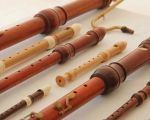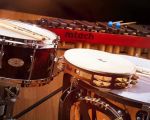Reviews of the Best Synthesizers for Music Production
As someone who's deeply passionate about music production, finding the right tools is essential to achieving professional-sounding tracks. One of the most important instruments in my arsenal is the synthesizer. It’s incredible how a synthesizer can transform a simple melody into a full, dynamic composition. In this post, I’ll share my personal experiences and reviews of the best synthesizers available for music production, based on my time in the studio and the gear I’ve used extensively.
1. Why Choose the Right Synthesizer?
When it comes to music production, the synthesizer is one of the most versatile and powerful tools. The synthesizer enables you to create virtually any sound—whether you’re going for an old-school analog vibe or cutting-edge digital sounds. But with so many options out there, how do you choose the right one for your needs? I’ve spent years experimenting with different synthesizers, and I’ve learned firsthand that the perfect one depends on your music genre, production style, and of course, your budget.
1.1 Analog vs Digital Synthesizers
One of the key decisions I made early on in my journey was whether to go with an analog or digital synthesizer. Analog synthesizers, known for their warmth and richness, are often favored by musicians who prefer a classic sound. On the other hand, digital synthesizers provide a broader range of sound design possibilities, allowing for more precision and flexibility. Both types have their pros and cons, but after testing multiple options, I’ve come to appreciate the balance between the two, depending on the track I’m working on.
2. Top Synthesizers for Music Production
Now that you know why synthesizers are so crucial to music production, let's dive into the top synthesizers I recommend. These are the ones that I’ve found deliver the best results, whether you’re a beginner or a seasoned pro.
2.1 Moog Subsequent 37
If you’re looking for a powerhouse analog synthesizer that’s versatile and can create rich, warm sounds, the Moog Subsequent 37 is an excellent choice. As someone who values the authenticity of analog synths, I was immediately impressed with its thick, lush tones. This synthesizer offers the signature Moog sound with a modern twist. The build quality is solid, and it features a plethora of modulation options to tweak your sound to perfection.
2.2 Roland TR-8S
Next up, we have the Roland TR-8S, a hybrid drum machine and synthesizer that I’ve found perfect for creating electronic beats. This machine blends digital precision with analog warmth, which is ideal for genres like house, techno, and EDM. The ability to load custom samples is one feature I love, as it allows me to personalize my sounds. Plus, its intuitive interface makes it easy to tweak in real-time during performances, making it one of the best tools for live music production.
2.3 Yamaha Montage 8
The Yamaha Montage 8 is a synthesizer that has quickly become one of my favorites, thanks to its expansive sound library and seamless integration into any music production setup. It’s a digital synthesizer, but it incorporates a powerful FM engine and sample-based synthesis, offering endless sound design possibilities. I use this for both film scoring and electronic music production, as it handles a wide range of sounds—from lush pads to sharp leads—extremely well.
2.4 Korg Minilogue XD
For those of you on a tighter budget but still looking for quality, the Korg Minilogue XD is a great option. This polyphonic analog synthesizer delivers fantastic sound for the price, with a variety of modulation and filter options. What I love most about the Minilogue XD is its versatility, especially for those new to synthesizers. Whether you’re working on a complex track or just want to create simple melodic loops, the Minilogue XD provides great results without breaking the bank.
3. What to Look for When Choosing a Synthesizer
When it comes to choosing a synthesizer, there are a few key features that I always consider. Based on my experience, these are the factors that determine the best synth for your needs:
3.1 Sound Quality
First and foremost, sound quality is everything. Whether you’re making house music, ambient, or film scores, the sound you create will define the track. That’s why I always prioritize synthesizers that produce clean, rich, and customizable tones. I recommend testing the synth in-store or listening to demos online to ensure the sound fits your style.
3.2 Modulation Options
The more modulation options a synthesizer offers, the more flexible you can be in your sound design. I love synthesizers that allow me to tweak filters, envelopes, and LFOs, as it opens up creative possibilities that wouldn’t be achievable with a more basic synth. Look for models that provide plenty of routing options for sound manipulation.
3.3 User Interface
A synthesizer’s interface plays a huge role in how quickly and effectively you can navigate its features. If you’re like me, you’ll appreciate a clean and intuitive interface that lets you focus on music rather than being bogged down by complicated menus. The best synthesizers for me are the ones that strike a balance between ease of use and powerful features.
4. Final Thoughts on Synthesizers for Music Production
Choosing the right synthesizer for music production can be a daunting task, but with a bit of research and hands-on testing, you’ll find the perfect fit for your needs. Whether you’re looking for analog warmth, digital precision, or a hybrid machine, the right synthesizer can help you elevate your music production game. Based on my personal experience, I highly recommend considering the models mentioned in this article for their versatility, sound quality, and user-friendly design.








